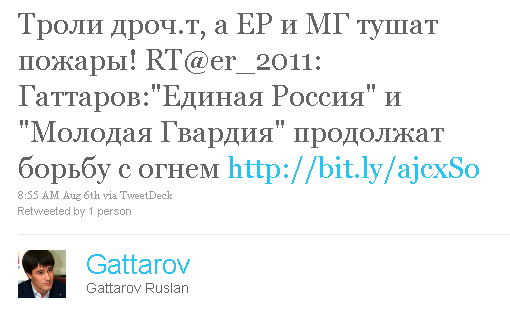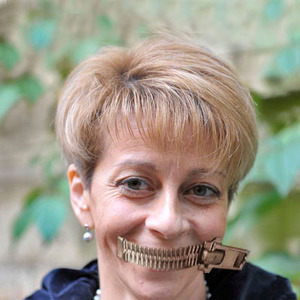This summer's wildfires made it possible to learn a lot about the role that the Russian Internet community plays in the society. We have seen that the social media activists were able not only to provide independent sources of information [1] [ENG] but also to cooperate with each other [2] [ENG]. There is one additional dimension, however.
Despite the initial, politically neutral position, bloggers found themselves in a situation where they had to, unwillingly, participate in a political clash. It’s not only that bloggers were critical of the poor governmental response to the disaster. The online community had a few direct clashes with the pro-government forces, primarily activists and supporters of the Russian ruling party Edinaya Rossiya [3] [ENG] (United Russia). The relationship between the blogger community and the pro-government forces had a high level of hostility.
One of the first episodes of the virtual struggle between bloggers and United Russia supporters took place when bloggers caught [4] [EN] United Russia forging photos, and Ruslan Gattarov, a senator and head of the ruling party’s youth wing Molodaya Gvardiya (The Young Guard), staging pictures of himself putting out fires [5]. Gattarov later explained [6] [RUS] that he had to upload fake photos in order to put some content on the site and had no time to deliver the real photos. He wrote [6] [RUS] that bloggers “could only stare at pictures and write nasty things” instead of putting out fires the way United Russia did. On his Twitter account, the senator was [7] [RUS] even less diplomatic:
Some time after the scandal, United Russia announced [9] [RUS] that Gattarov would be replaced as the leader of Molodaya Gvardiya. Although the official version said it was a planned replacement, a popular belief was that the Kremlin had been dissatisfied both with Gattarov's inadequate wildfires response and his ignorant public declarations. Piligrim-67, a blogger who helped to raise the issue, said [10] [RUS] in an interview to a local media outlet that “effective and fast justice is possible only on the Internet.”
Gattarov also heads the United Russia's blogosphere council that was created in June 2010 and should improve the online image of United Russia as well as manage the network of its online supporters. The activities of the council had been investigated [11] [RUS] by blogger spburger-senior.
Another major incident was a “black PR” attack against Yelizaveta Glinka (aka LJ user doctor-liza [12]), a doctor and one of the leaders of the volunteer movement. The official website of United Russia published [13] [RUS] an offensive article that accused Glinka of having political ties with the Spravedlivaya Rossiya [14] [ENG] (A Just Russia) party. The article had a photoshopped image of Glinka with a zipped mouth. All the volunteers were accused by the United Russia “experts” of having political connections to “A Just Russia.” The reason for the United Russia media outburst was that after a consultation [15] [RUS] with her readers, Glinka refused to give an interview to the party website reporters.
Glinka's readers were extremely against any kind of cooperation with the ruling party. “Do you understand what they need this information for? They want […] say that it was done by them”, wrote [17] [RUS] jestianka.
Blogger g_zharkov wrote [18] [RUS]:
Лиза, не свяывайтесь после того как сенатор Гаттаров потушил поддожженной самим собой дерево, а потом ушел на выходные – любое общение с ними позор для любого реального добровольца как мне вчера сказали молодые и реально помогающие ребята из Владимирской глубинки “давайте жить так, как будто их и вправду нет”
Glinka wrote [19] [RUS] that United Russia would now try to close her LiveJournal account and would keep harassing her.
The offensive article on the United Russia website has only made bloggers angrier. LJ user avmalgin wrote [20] [RUS]:
Это самая настоящая травля, по-другому назвать нельзя. Причем травля человека, который действительно занимается делом. Если вспомнить, что еще не так давно доктору Лизе ломали ее ЖЖ, который был основным инструментом в ее подвижнической деятельности, складывается вполне ясная картина.Все уже знают, как бесстыдно и неуклюже “партия власти” пытается пиариться на пожарах. […] Прикоснуться к “Единой Росии” – значит запачкаться. Но беда в том, что они пытаются испачкать тех, кто с ними не желает иметь дело.
Another clash took place between the Ushahidi-based project Help Map [21] [ENG] (Russian-fires.ru [22]), an independent, non-political platform, and the website of United Russia supporters, called Storonniki [23] (“Supporters”). The banner of Help Map was placed misleadingly under the information about Storonniki's own coordination center, and the organization ignored Help Map's requests to re-position the banner.
On August 21, Igor Cherski, another leader of the volunteer movement, drew attention to the inappropriate banner. Cherski wrote [25] [RUS] on his blog:
Ваш баннер и ссылка на “Карту помощи” появились вот здесь: http://www.storonniki.info/ [23]
Вы в курсе происходящего? Вас использовали или теперь вы работаете вместе со сторонниками ЕР? Просто интересно, ничего личного.
The question raised by Cherski caused another wave of of anger among bloggers. LJ user eresiru called it [26] [RUS] an ideological mistake that would lead to total disappointment of the supporters of Help Map. Convincing people that Help Map had nothing to do with United Russia wasn’t an easy task. The site already had a disclaimer that the project had no affiliation with any political group, but now the creators had to add an explanation [27] [RUS] on the top of the page that they were not cooperating with any politicians, and United Russia in particular, since it acted immorally throughout the disaster. Eventually, the banner was removed from Storonniki website, and Cherski acknowledged [28] [RUS] that Help Map had nothing to do with the Russian ruling party.
Later, however, i_cherski [29] dedicated a special post to the clarification of his position in regard to United Russia. He emphasized that the behavior of United Russia had been nothing to be proud of, but suggested that the online community should not automatically disregard any cooperation with United Russia activists. Some bloggers opposed Cherski’s idea:
“The best thing we can do is ignore them,” wrote [30] [RUS] eckero.
“Everything they touch turns into farce. They spend money on PR without any real effect,” radvi_sasha responded [31] [RUS].
Blogger kaktuso concluded [32] that there was no sense in helping even the reasonable members of the party since it would do nothing but promote United Russia.
Unfortunately, the clashes weren't limited to online space only. On August 28, doctor-liza published a post about a visit of an unknown male, who entered through the open door and threatened her. She wrote [33] [RUS]:
Он встал около двери нашей кухни – со сложенными за спиной руками.
С акцентом он спросил
– Это ты? “Справедливая помощь?”
– Я. Руки из – за спины выньте.
– Ты, б…дь, чего хочешь?
– Что бы Вы ушли.
– Уйдешь отсюда ты. Сука. Б…ь. Через тридцать дней. Б…ь.Насовсем.
И так несколько раз.
He asked with an accent:
– Is it you? The Just Help [Foundation]?
– It's me. Your hands – [put them in front of you].
– What do you want, b…ch.
– I want you to go.
– You will go, b…ch. In 30 days. Forever.
And he repeated that a few times.
Then the man promised to return and left. Glinka asked volunteers to forgive her for getting them involved in a dangerous situation, asked them to stop visiting her and promised to increase security measures. Still, it is unclear if this episode is connected with the earlier conflict with United Russia.
Two “imagined communities” in Russia: TV audience and online audience
The bloggers’ community has demonstrated not only the feeling of dissatisfaction, but a high degree of hostility towards the government and United Russia. Opposition to the government was a common denominator for the majority of online activists, despite the fact that volunteers’ platforms had no political or oppositional background.
The critical attitude of the blogosphere differed significantly from the perception of the wildfire events by the majority of Russians. A poll by Levada Center showed [34] [RUS] that most Russians thought that the government's response had been good, while the support ratings of the Russian president Dmitry Medvedev (73%) and prime minister Vladimir Putin (78%) had even slightly improved. 27 percent of the respondents said their opinions about the state’s leadership had improved, 57 percent said that it had remained unchanged and only 12 percent said that it had become worse. The most popular answer about the cause of the wildfires (39 percent) was that they were a natural phenomenon caused by extreme weather, and that no one could be held responsible for it.
Aleksey Grazhdankin, deputy director of Levada Center, explained [35] [RUS] that the numbers depended on how the information of the wildfires had been presented to the public by the mainstream media (MSM). TV-watchers and bloggers had completely different sets of information. The blogosphere was full of firsthand information about the scale of the disaster, while the MSM avoided dramatization and focused more on the government’s response than on the disaster itself or its victims.
In this case we can see that the Internet actually triggers offline activity (and is not making people more passive, as it is sometimes argued), because it provides an independent picture of reality, shows that action is required and suggests ways of facilitating this action. “Enlightened” bloggers are relatively few in Russia (according to various estimates, between 20,000 and 50,000 people), and are completely outnumbered by the majority who uses the MSM as a major source of information, which often has a pro-government slant.
Benedict Anderson, a renowned historian, approached the media as a mechanism of formation of social groups with a common identity, which he called “imagined communities” [36] [ENG].
The wildfires have shown that there are two very different “imagined communities” in Russia: TV viewers and social media users. They have different, and often quite opposite, attitudes, which affect how they act. The consumption of information online is deeply interrelated with social interaction, and, due to this and other factors, the Internet community is a much stronger, more effective and united, “imagined community.”
If in the previous article we argued [2] [ENG] that the unaccountability of the government had triggered online cooperation, in this case we see that the degree of cooperation depends on the information source. To be provoked by the state’s unaccountability, people should first be informed that the government is unaccountable. This is what has been done by the Russian social media, whose approach is so different from MSM.
The divide between the two communities is deepening, although the TV community is still the decisive majority. The balance between the passive majority and the active minority presents an electoral dilemma: which political strategy should the Russian leaders choose to address both “imagined communities”?
In his recent article, Alexey Sidorenko suggests [37] [RUS] three scenarios for development of the Russian Internet – liberalization, preservation of the current ambivalent status quo, and a significant increase of censorship and filtering. I would like to add the fourth scenario, a futuristic one, that would suggest the aforementioned divide to take place and to form a dual state – the “virtual” one, made up of netizens, and the “real” one, made up of the TV spectators. We may assume, however, that in this case the authorities will do anything to make Internet as close as possible to the TV model [38] [ENG].


